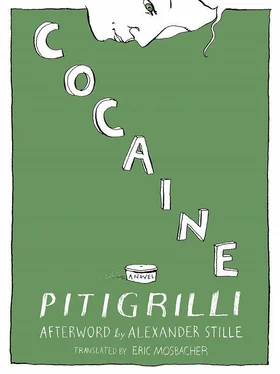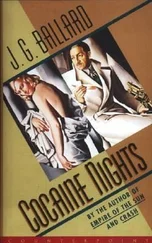The chief sub-editor was forty.
“I detest tabarins,” he said, emptying his fourth glass of cognac. “All those people who dance in basements to harrow each other’s nerve endings and think they’re enjoying themselves don’t realize in their frenzy that they are passive instruments in the hands of nature, which provides them with the excitement of the dance in the interests of the reproduction of the species.”
He emptied another glass.
“I laugh out of politeness,” he went on a little later. “I laugh to try and hide my melancholy. And, as I don’t succeed in hiding it either from myself or from others, I drink, to hide it at any rate from myself. I drink to get rid of my mental wrinkles, but they can’t be got rid of, they can only be smoothed out for a moment, like the lines that women smooth out with facial massage. For a short time they vanish, and then they come back deeper than ever.”
He drank again.
“As a result of spending a lifetime in newspaper composing rooms I’ve got used to reading upside down, to seeing things the wrong way up. It’s a sad gift. Thanks to it I lost confidence in the loyalty of a friend who was dear to me, and I discovered that the woman who pretended to love me despised and betrayed me.
“So now I drink.
“I drink, and drink will be my ruin. I know it, but it helps me to see things through rose-tinted spectacles, and that’s enough for me. And then when I look at the world I see it as the optimists paint it.”
“And when you haven’t been drinking?” Tito asked.
“When I haven’t been drinking… Permit me a slight digression. When believers, mystics, look at the world, they don’t see beautiful, provocative women or pleasure-loving men; they see skeletons, skulls with empty eye-sockets, jaws without tongues, teeth without gums, shamefully bald heads, feet that seem to be made of imperfect dice, long hands that look like the mouthpieces of pipes strung together. But when I look at mankind I see spinal columns, spinal cords and nerves branching out from them.”
“So much for men,” said Tito. “And what about women?”
“Women? Roving uteri. That’s all. I see roving uteri and men pursuing them, hypnotized, talking confusedly of glory, ideals, humanity. And so I drink.”
Through the steamed up windows two dense and continuous streams of people were to be seen. The sound of their voices, the brouhaha, the trampling of feet, the movements of the crowd, suggested a color — bitumen mixed with a uniform grayish yellow, against which the occasional cry of a hawker, the loud laughter of a street Arab or a woman’s shrill voice stood out like splashes of red, blobs of white, daubs of violet, parabolas of silver, jets of lilac, quivers of green, hieroglyphics of yellow, arrows of blue. The agile, springy legs of women contrasted with the leaden monotony, all of them long, slender, muscular, pink and wrapped in their silk stockings as if by a spiral of thread that wound round their thighs and calves like the grooves of gramophone records.
The modern Venus no longer has the soft, plump gracefulness that our grandfathers sought for (with their hands); the contemporary Venus reminds one of the androgynous girl in a troupe of British gymnasts.
“And so I drink,” said the man who smiled out of politeness. “Love might perhaps be left to me, but I’ve at last realized what love is. It’s a sweet poison that comes to me from a woman I like. After some time all the poison I’ve absorbed makes me immune, and then the poison that continues to come to me from her no longer affects me.
“Once upon a time I still had the stimulus of being faced with rivals, and I tried to fight them, but now that I’m chief sub-editor, now that I’ve ‘arrived,’ I’m also finished. I’ve lost the joy of struggle, chiefly because I have no more enemies, but also because if I had I would not take the trouble to fight them. I’ve come to see that competitors are necessary to those who want to get on in the world. Opposition is indispensable to success. We should have realized that elementary truth from the embryonic beginnings of life; spermatozoa have to swim upstream to reach the ovary.”
“That’s a paradox,” said Tito.
“I never state paradoxes, because generally they are nothing but cleverly presented absurdities,” the chief sub-editor replied. “I claim that enemies are extremely useful when you know how to handle them properly. In medicine, as you know better than I do, germs are used to fight the illnesses that they cause, are they not? The whole of serotherapy is based on the exploitation of our enemies to our own advantage. Isn’t the leech a parasite of man? Well, in a doctor’s hands it’s a very useful thing. Enmity is a force, a negative, contrary force, but it’s still a force, and all forces are exploitable by man to his own advantage. What do you think?”
Pietro Nocera replied:
“I think that with a mind like yours —”
Tito interrupted: “… it’s a pity to ruin it with alcohol.”
The chief sub-editor turned to Tito and said: “You remind me of those who say it’s stupid to believe that seventeen’s an unlucky number, because it’s a number like any other; thirteen is unlucky, of course, they admit, but seventeen isn’t. That’s exactly what you do, Arnaudi. You’re killing yourself with cocaine, and you think it’s stupid of me to be killing myself with alcohol. You don’t see that if the two of us get on well it’s because there’s an affinity of poisons between us which in turn has led to an affinity of ideas.
“You and I have the same type of mind, and basically Pietro Nocera has it too. The three of us get on well because we are all three attuned. We are simply men of our time, not three exceptional individuals who have come together to form a particular triangle. I may be wrong in saying that it’s our poisons that have made us like this. Perhaps it’s our being like this that makes us drown ourselves heroically in our sweet poisons. However that may be, I’m happy poisoning myself; and, as it give me a little joy, it would be absurd not to do it. If half a liter of alcohol is sufficient to do away with depression and transform the world in my sight, and if all I have to do to get half a liter of alcohol is to press a button, why should I deprive myself of it? If it were painful, I should understand. We could rid ourselves of all the agonies of love by having an operation, but it would be painful, and an operation is always a step in the dark. Instead I regulate my intake of alcohol myself; it’s a tool I use on myself with my own hands. I know very well that it earns me a great deal of disapproval, but I go on drinking all the same, because these five or six glasses give me a sense of well-being and result in insults seeming to be acts of courtesy, in sorrows being transformed, if not into joys, at least into indifference. Being removed from reality, I see it with the changed perspective that forms the basis of irony. What could be better than being near one’s neighbor without recognizing anyone and living in a kind of unconscious intoxication? Fools say I’m ruining myself, but what I say is that the fools are those who cling to the useless and contemptible thing that is life. Even our editor, who has such a clear mind, sometimes makes me sit down in front of him, tries to counteract the bellicosity of those ferocious moustaches of his by the gentleness of his voice and advises me to give up drink. But it’s only when I’ve been drinking that I’m fit for work, flexible, docile. When I’ve been drinking he could order me to polish the floor and I’d do it.”
A thin, pale lady, dressed completely in black, came in, looked round, and sat at a table.
“ De quoi écrire et un Grand Marnier,” she said.
Читать дальше



